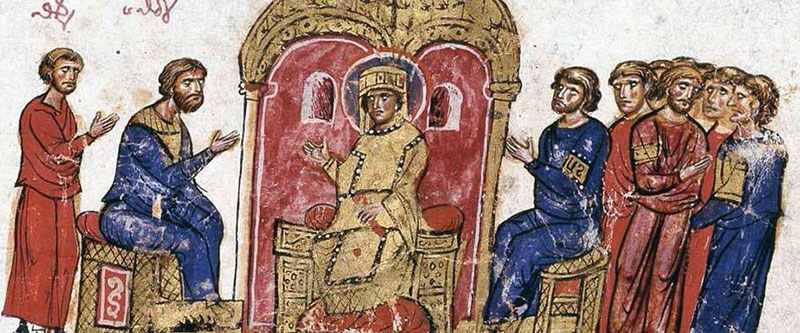I am a “retired” pastor. I placed the word “retired” in quotation marks (twice now) because I am still trying to discern what that word means. Mr. Webster supplies some helpful hints, but they tend not to correspond to my current life. Did I mention that I recently turned eighty? I did. One of my former catechism students from Canada wrote me happy birthday wishes and asked what it felt like to be eighty. I responded that it felt a lot like seventy only older. I’m not certain that helped her.
One thing I have noticed is that with all the emphasis placed on youth in America in our time, once you turn seventy or so, people think of you as too old for anything, including preaching and teaching. It’s the age number that is hard for people to overcome.
Stating the Problem
I must admit that I do get a lot more reading done these days, which brings me to the reason I am writing this blog post. A youngish Christian recently wrote about some of the serious problems in the contemporary church setting, among which was a deplorable lack of ethical discernment and reflection. I agree wholeheartedly. The young man formulated his concern in the form of a question: “How do most Americans get training in ethical reflection?” By extension, we might ask, “Where do serious-minded Christians go to learn how to make God-pleasing ethical decisions?” Certainly, home is an option for ethical instruction, but the local congregation ought to be as well.
Granted, there are—thankfully—still Christian congregations where the congregants are challenged by excellent expository preaching and Sunday School classes that are challenging and informative. In the twenty-first century, however, many of those local churches are assigned to the “endangered species” list. With the advent of the homeschooling phenomenon, some parents have taken the time to ensure that their children receive a thorough grounding in mature Christian decision-making, along with catechetical instruction that provides a solid outline of the essential, fundamental doctrines of the Christian faith. In addition, there are still Christian high schools that offer courses—as in “more than one”—in ethics, but they, too, are becoming increasingly rare. Not to teach our youth Christian ethics and worldview is spiritually to shortchange them. Exposure to the twenty-first-century world is a dangerous and hostile undertaking.
It would be a sheer novelty to locate a state college or university that provided any formal ethical instruction, but assuredly all of the secular institutions of “higher learning” teach/indoctrinate their students in the secular version of ethics. On second thought, it would be a near miracle to find such courses in our locales. Approximately fifty or so years ago, H.L. Mencken famously quipped that “there is no idea so stupid that you cannot find a professor who will believe it.” While that is meant to be mildly humorous, there is more than a modicum of truth enveloped in it.
When I speak or write about the contemporary Church of Christ, I am generally referring to what we witness results of the mega-church, emergent/emerging church, Social Justice Warrior, and woke congregations from the early 1970s until the present and their various combinations and permutations. In my forty-five years of pastoral ministry in three different countries (The Netherlands, Canada, and the United States) I have surmised that we are facing at least three generations of professing Christians that have not been fed the spiritual food they and we all so desperately need.
What I have observed is that a growing number of professing Christians, young, older, and very much older, have not received much or any substantive training in how to think about ethics and ethical issues. Every two years, Ligonier Ministries conducts a theological survey focused on the beliefs of those who are avowed “evangelicals” and who attend worship on a regular basis. Yearly, the results of that survey increase in their disheartening results. Understanding of rudimentary Christian truth/doctrine deteriorates yearly, followed closely by deviations from what ought to be easily discernible ethical reflection. It is noteworthy that views on abortion on demand, homosexuality, transgenderism, economics, politics, and worldview—just to mention a few—trend in a disturbing direction. The obvious danger for the Church is that if contemporary, popular churches continue to ignore serious ethical reflection, congregants will continue to be molded and shaped by a culture that is openly hostile to Christianity.
Returning to the notion of schools for a moment, especially Christian high schools, there needs to be a greater emphasis on Bible, the formation of a biblical life and worldview, languages, the fine arts, and ethical decision-making using the Ten Commandments as Christian Ethics 101, whether it is a strictly homeschool situation, a homeschool co-op, or a regional Christian high school. In addition, there should be a far greater emphasis on the confessions, creeds, and catechisms of the Christian faith in all of those situations.
No, the confessions, creeds, and catechisms are not infallible. Infallibility and inerrancy are reserved only for Scripture. Nevertheless, I contend that the historic confessions, creeds, and catechisms are far superior to anything you and I could cobble together. How can the modern Church, then, at least take some serious steps at what I am describing?
The Way Back
There are many roads that lead us back in the right direction. Allow me to outline just a few. First, we must conclude that bigger isn’t always better. That is, a mega-church with many varied “programs” is not always the best church for modern Christians. In fact, it can be argued that a smaller, more family-oriented congregation could surpass our needs and expectations. A faithful pastor, who week-in and week-out enters the pulpit and unashamedly, boldly, yet simply and understandably, proclaims God’s truth from the scriptures is to be preferred.
Second, you might want to find a congregation that takes Sunday School seriously. One ethicist suggested that Sunday School ought to be similar to military boot camp. Of course, it might not be a drawing card to tell everyone that your Sunday School is like boot camp, but the idea is appealing for a number of reasons. For those of us who have experienced boot camp, we know that it was there that we received the fundamentals of what would keep us alive on the battlefield—we did not receive everything mind you, but certainly the basics that would serve us well and help us survive. Moreover, after boot camp there was a period called A.I.T. or Advanced Individual Training where we were the recipients of training that would refine the basics that we learned in boot camp. For the children, their parents ought to be looking for a congregation that teaches the youth from one of the Church’s catechisms. From my tradition, I am thinking of the Westminster Shorter Catechism and the Heidelberg Catechism. Both are excellent.
Third, and this follows closely on the two previous points, you should be looking for a congregation that through the preaching, teaching, fellowship, and prayers, aims at your spiritual development. What I am describing I usually call a congregation that acts and lives like a “covenant family.” What is that? Generally, it is a body of believers who genuinely love and care for one another. They mourn with those who mourn and rejoice with those who rejoice. They enjoy being around one another and if there is a physical need in the congregation they pitch in to help with meals, transportation, or whatever is needed. They eagerly look forward to worship and learning what God would have them do and how he would have them live—albeit imperfectly. They comprehend the simul in Martin Luther’s famous dictum Simul iustis et peccator. Speaking on justification by faith, Luther described the sinner saved by grace as, at one and the same time (simul), justified and a sinner. We have not arrived in our walk of faith, but we are on the journey of the Christian life. God has placed us on the road that will eventually take us “home.” That is where we want to be, but in the meantime, we seek a meaningful and purposeful life here on earth, fearing God and keeping his commandments.
Dr. Ron Gleason
Bluffton, SC











